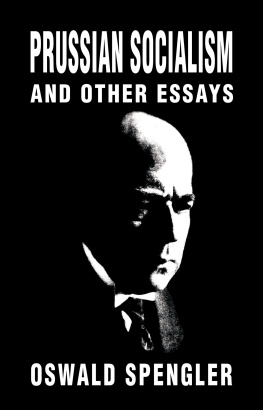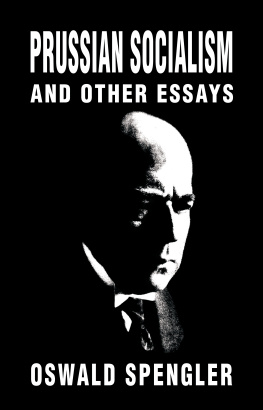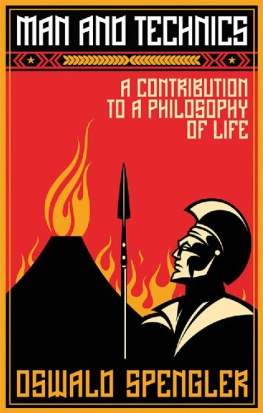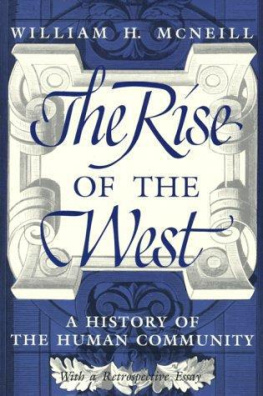The Decline of the West the Complete Edition Oswald Spengler Comments by: Pauline Nealy
Lighthouse Books for Translation and Publishing. www.lighthousebooks.org All rights reserved. This publication is copyrighted. You must not circulate this work in any other form and you must impose this same condition on any acquirer. ISBN 10: 3593301830 ISBN 13: 9783593301839 
Introduction
Oswald Spengler, (born May 29, 1880, Blankenburg, Germanydied May 8, 1936, Munich), German philosopher whose reputation rests entirely on his influential study Der Untergang des Abendlandes, 2 vol. (191822; The Decline of the West), a major contribution to social theory.
After taking his doctorate at the University of Halle (1904), Spengler worked as a schoolmaster until 1911, when he went to live in Munich on a small inheritance and began work on Der Untergang. The first volume, published in 1918, won him immediate acclaim from the general public. The second volume followed in 1922, and a revised edition of the first a year later. From 1919 onward, Spengler tried to turn his reputation to account as a political commentator, but he met with little success. Der Untergang is a study in the philosophy of history. Spengler contended that because most civilizations must pass through a life cycle, not only can the historian reconstruct the past but he can predict the spiritual forms, duration, rhythm, meaning and product of the still unaccomplished stages of our Western history.
Unlike Arnold Toynbee, who later held that cultures are usually apparented to older cultures, Spengler contended that the spirit of a culture can never be transferred to another culture. He believed that the West had already passed through the creative stage of culture into that of reflection and material comfort (civilization proper, in his terminology) and that the future could only be a period of irreversible decline. Nor was there any prospect of reversing the process, for civilizations blossomed and decayed like natural organisms, and true rejuvenation was as impossible in the one case as the other. Spenglers work won scant approval from professional scholars, who were scandalized by his unorthodox methods and contemptuous of his errors of fact. He was also criticized by the National Socialist Party, despite some affinity between his political ideas and Nazi dogma, and, after Adolf Hitlers rise to power in 1933, Spengler lived in isolation until his death. The German philosopher Oswald Spengler (1880-1936) is famous for his Decline of the West.
He held that civilizations, like biological organisms, pass through a determinable life cycle and that the modern West was approaching the end of such a cycle. Oswald Spengler was born at Blankenburg am Harz on May 29, 1880, the son of a postal official. Although mathematics and natural science were his major subjects at the University of Halle, he received his doctorate for a dissertation on Heraclitus in 1904. After recovering from a nervous breakdown in 1905-1906, Spengler taught in secondary schools until a small inheritance from his mother allowed him in 1911 to move to Munich as a private scholar. Spengler never married. Exempted from military service because of poor health, Spengler wrote the major part of The Decline of the West during the war years under conditions of great economic hardship.
The first volume appeared in 1918, the second in 1922. The Decline of the West is an impassioned attack against the values of modern post-Enlightenment civilizationof intellect, social equality, peace, and urban culture. Borrowing from the anti-intellectualist tradition of German conservative thought, he rejects the possibility of scientific history. History is never "correct" or "erroneous" but only "deep" or "shallow." Human history as such has no meaning. In place of the traditional Europeocentric conception of a linear history of human civilization, Spengler offers a "Copernican" view of history in which Western (or Faustian) civilization since A.D. 1000 constitutes merely one of eight historic cultures.
Each culture has a wholly individual way of looking at the world which permeates all its cultural expressions, even its mathematics and science. No understanding is possible between men of different cultures. Nevertheless, the similarity of the life processes of birth, growth, and decay makes possible a "comparative morphology of history." A culture is born out of the historyless mass of humanity the moment "a great soul awakens." All cultures in their beginning are aristocratic, dominated by the heroic estates of the warrior noble and priest. The maturation of a culture is a process of intellectualization, urbanization, social leveling, and the growing domination of money. In this process the creative essence of the culture is progressively lost until the culture, now become shallow, gives way to a soulless megalopolitan "civilization." In the West this transformation occurred in the 19th century. Democracy, behind which hides the dictatorship of money, then opens the path to Caesarism and the dissolution of the culture into total formlessness.
Democracy, parliamentarism, egalitarianism, proletarian socialism, pacifism, humanitarianism, and attempts at "world improvement" and social reform, Spengler concluded, were all symptoms of a decadent civilization. The moral to be learned from world history is that "ever in History it is life and life onlyrace quality, the triumph of the will to power" which counts. The Decline of the West catapulted Spengler to fame. He became a political prophet for disillusioned German national conservatives stunned by defeat in World War I. Beginning with his essay "Prussianism and Socialism" (1920), in which he sought to lay the basis for a new revolutionary conservatism which identified socialism with service to the state, Spengler devoted himself to free-lance political writings against the Weimar Republic, which he detested. Despite his strident opposition to democracy, his idealization of authoritarian and military values, and his almost paranoid racism, he regarded the Nazis with mistrust.
As an elitist, he was repelled by their demagogic appeal. The Nazis regarded Spengler as one of their intellectual forerunners. Adolf Hitler received him in 1933. Nevertheless the critical tone of his Hour of Decision (1933) resulted in the condemnation of the book and the man by the Nazis. Spengler died on May 8, 1936.
The Decline of the West the Complete Edition
THE DECLINE OF THE WEST THE DECLINE OF THE WEST FORM AND ACTUALITY BY OSWALD SPENGLER AUTHORIZED TRANSLATION WITH NOTES BY CHARLES FRANCIS ATKINSON MCMXXVII: ALFRED A KNOPF: NEW YORK COPYRIGHT 19x6, BY ALFRED A.
KNOPF, INC. PUBLISHED, APRIL, 19x6 SECOND PRINTING, APRIL, 19x6 THIRD PRINTING, JULY, 1916 FOURTH PRINTING, NOVEMBER, 1916 FIFTH PRINTING, DECEMBER, 19x6 SIXTH PRINTING, MAY, I92.7 MANUFACTURED IN THE UNITED STATES OP AMERICA THIS TRANSLATION IS DEDICATED TO ELLINOR JAMES A FRIEND Wenn im Unendlichen dasselbe Sich wiederholend ewig fliesst, Das tausendfdltige Gewolbe Sich krdftig ineinander schliesstj Stromt Lebenslust aus alien Dingen, Dem kleinsten wie dem grossten Stern, Und alles Drdngen, alles Ringen 1st ewige Ruh in Gott dem Herrn. Goethe. TRANSLATOR'S PREFACE It must be left to critics to say whether it was Destiny or Incident using these words in the author's sense that Spengler's "Untergang des Abend landes" appeared in July, 1918, that is, at the very turning-point of the four years' World-War. It was conceived, the author tells us, before 1914 and fully worked out by 1917. So far as he is concerned, then, the impulse to create it arose from a view of our civilization not as the late war left it, but (as he says expressly) as the coming war would find it.
Next page








